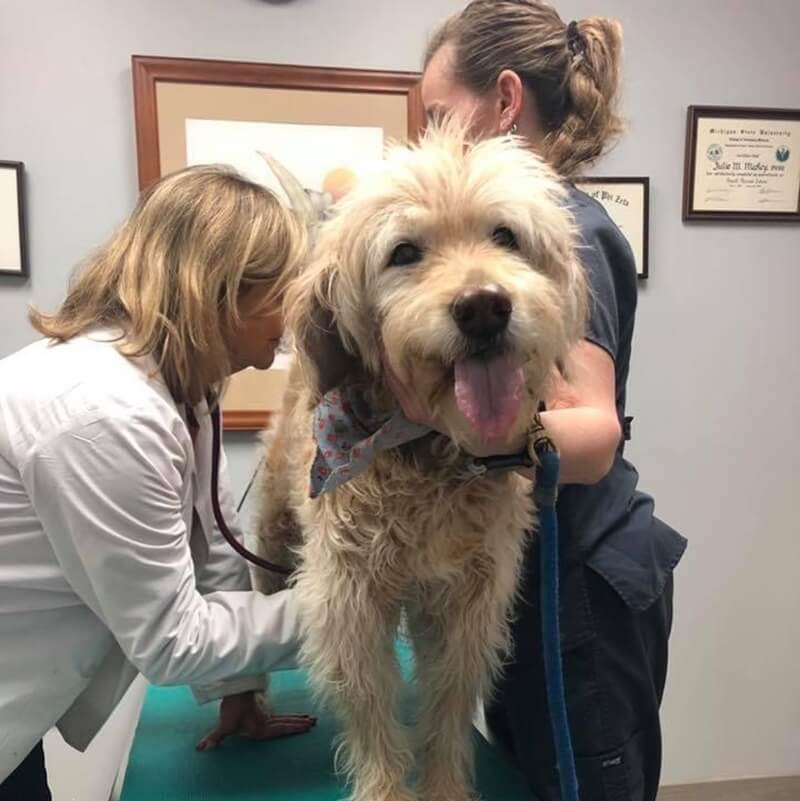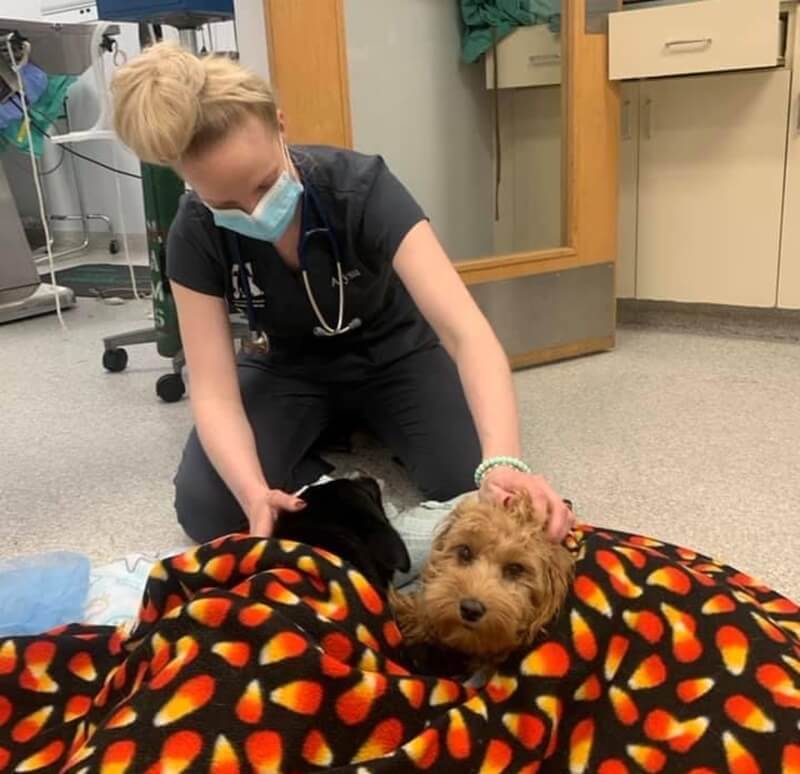Pet Wellness Care
Allowing Chestnut Street Animal Hospital to examine your pet annually and keep the necessary vaccinations up to date can help your pet live a longer, healthier life.
Pet Wellness Care
Regular wellness examinations or checkups can be extremely beneficial to your pet. Wellness exams are an excellent opportunity for us to conduct a thorough physical examination that can assist us in identifying medical problems and other issues that may affect your pet’s health and quality of life.
Just like you, we want your cat to live the longest, healthiest life possible. That starts with the basics: quality food, enough exercise, good grooming, and yes, regular check-ups.
Annual exams are your pet’s first line of defense. Chestnut Street Animal Hospital’s comprehensive annual exams include checking their overall health by taking their temperature, examining skin and coat, lung and cardiac function, internal health, oral hygiene, eyes, ears, and demeanor.
Vaccinations: Keeping your cat up to date on immunizations and booster shots is a highly effective way to prevent many common diseases and infections like distemper and rabies. Beyond those core vaccines, your pet’s age, lifestyle, and likely exposure to certain diseases will be evaluated before we recommend additional inoculations.
Dental Care: Imagine what your teeth would be like if you never cleaned them. Well, the same thing is happening to your cat’s teeth without good oral care. We recommend annual dental cleanings and can show you tips for brushing your pet’s teeth, which can reduce the need for expensive extractions and more serious dental work down the line.
Parasite Control: Fleas, ticks, worms – preventing them in the first place is much easier and ultimately less expensive than getting rid of them after they’ve infested your cat. We recommend monitoring your pet and having them screened for internal parasites regularly, and we offer a variety of alternatives for flea, tick, and heartworm prevention.
Proper Nutrition: There are a lot of choices when it comes to what to feed your feline friend. Cats are true carnivores and making sure they get proper nutrition is very important to their health. Our veterinarians can help you figure out what is best for your cat and your lifestyle.
Behavioral Evaluation: Changes in mood or behavior, lack of grooming, or litterbox problems can often be a symptom of an underlying medical condition. Swiftly addressing these shifts can help to identify and treat the root cause.
Skin and Coat Care: Cats are fastidious by nature, but felines with long, thick coats and those who live indoors still may need regular brushing, grooming, and nail trims. Proper skin and hair care can prevent things like mange, matting, bacterial infections, and more.
Exercise: Cats are athletic creatures and getting enough exercise–especially if they live indoors–is extremely important in maintaining cardiovascular health and a healthy weight.
Senior Animals: At Chestnut Street Animal Hospital, we love elder pets! We also know that preventative care is even more significant for them. Cats are living longer than ever, making them more susceptible to disease and illness as they age. We recommend twice-yearly exams and screenings for senior cats to help prolong and improve the quality of their life.
Just like you, we want your dog to live the longest, healthiest life possible. That starts with the basics: quality food, enough exercise, good grooming, and yes, regular check-ups.
Annual exams are your pet’s first line of defense. Chestnut Street Animal Hospital’s comprehensive annual exams include checking their overall health by taking their temperature, examining skin and coat, lung and cardiac function, internal health, oral hygiene, eyes, ears, and demeanor.
Vaccinations: Keeping your canine up to date on immunizations and booster shots is a highly effective way to prevent many common diseases and infections like distemper and rabies. Beyond those core vaccines, your pet’s age, lifestyle, and likely exposure to certain diseases will be evaluated before we recommend additional inoculations.
Dental Care: Imagine what your teeth would be like if you never cleaned them. Well, the same thing is happening to your dog’s teeth without good oral care. We recommend annual dental cleanings and can show you tips for brushing your pet’s teeth, which can reduce the need for expensive extractions and more serious dental work down the line.
Parasite Control: Fleas, ticks, worms – preventing them in the first place is much easier and ultimately less expensive than getting rid of them after they’ve infested your pet. We recommend monitoring your pet and having them screened for internal parasites regularly, and we offer a variety of alternatives for flea, tick, and heartworm prevention.
Proper Nutrition: There’s so much confusion about what to feed dogs. Grain-free kibble? Home-cooked meals? Raw food diet? Proper nutrition is so important to your pet’s good health, and we can help you figure out what is best for your pet and your lifestyle.
Behavioral Evaluation: Changes in mood or behavior can often be a symptom of an underlying medical condition. Swiftly addressing these shifts can help to identify and treat the root cause.
Skin and Coat Care: Grooming and washing are fundamental aspects of proper pet hygiene. Proper skin and hair care can prevent things like mange, matting, bacterial infections, and more.
Exercise: Regular workouts support musculoskeletal and cardiovascular health in dogs of all ages, as well as improve their overall mental well-being.
Senior Animals: At Chestnut Street Animal Hospital, we love elder pets! We also know that preventative care is even more significant for them. Dogs age much more rapidly than humans, so diseases and illnesses progress faster as well. We recommend twice-yearly exams and screenings for seniors to help prolong and improve the quality of their life.
Congratulations on your adorable new feline friend! Your Chestnut Street Animal Hospital veterinarian is your partner in making sure your kitten gets the best start possible. Our Kitten Wellness Program was created to make sure your new friend gets started off on the right paw because the first few months of a young cat’s life are critical to its development, future health, and well-being.
You should schedule your kitten to see the veterinarian as soon as possible after you adopt. Below is information on what you can expect when you bring your pet in for his or her initial exam.
Comprehensive Physical Exams
Is your kitten’s growth on track? Are there any telltale signs of current or future health issues? How large will my kitten get? These are all questions that can be answered by your veterinarian with a physical exam.
Vaccinations
Just like newborn babies, the immune systems of young pets are not fully developed. This means they are more susceptible to disease, and therefore kittens need a series of vaccinations given at monthly intervals to be protected. In this package, your kitten will receive rabies and panleukopenia (distemper) shots, and depending on your cat’s risk, vaccinations for feline leukemia virus (FeLV) may be recommended.
Intestinal Parasite Screening
It’s very common for kittens to have worms, and they can make your new friend very sick and weak. Some of these worms can also be passed to your human family members. Fecal testing for intestinal parasites is a must for kittens. Should your pet test positive for hookworms, whipworms, roundworms, or tapeworms, treatment is at an additional cost but is usually very reasonable.
Microchipping
One of the most important things you can do for your pet is to make sure he or she is microchipped. Unlike collars, microchips stay with your pet for life and will make it much more likely your dog will be returned to you if lost.
First Doses of Flea, & Tick Preventative
Fleas and ticks are not only unpleasant, but they also carry disease and can be very detrimental to a young cat’s health. We’ll make sure your kitten is protected with their first doses of flea and tick prevention.
Behavior & Nutrition Counseling
While it may be true that kittens don’t come with instructions, counseling with our veterinarians about litterbox training, the importance of socialization (yes—cats are actually very social!) and other basic behavior information will set your kitten up for success as a family member. We can also advise you on feeding schedules and options for optimum health.
To schedule your kitten for a visit, make an appointment online or call 781-444-8838.
For many pet lovers, there is nothing more exciting and fun than getting a new puppy! Your Chestnut Street Animal Hospital veterinarian is your partner in making sure your puppy gets the best start possible. Our Puppy Wellness Program was created to make sure your new friend gets started off on the right paw because the first few months of a young dog’s life are critical to their development, future health, and well-being.
You should schedule your puppy to see the veterinarian as soon as possible after you adopt. Below is information on what you can expect when you bring your pet in for his or her initial exam.
Comprehensive Physical Exams
Is your puppy’s growth on track? Are there any telltale signs of current or future health issues? How large will my puppy get? These are all questions that can be answered by your veterinarian with a physical exam.
Vaccinations
Just like newborn babies, the immune systems of young pets are not fully developed. This means they are more susceptible to disease, and therefore puppies need a series of vaccinations given at monthly intervals to be protected. In this package, your puppy will receive rabies (required by law), canine distemper series, Lyme series, leptospirosis, and Bordetella series.
Intestinal Parasite Screening
It’s very common for puppies to have worms, and they can make your new friend very sick and weak. Some of these worms can also be passed to your human family members. Fecal testing for intestinal parasites is a must for puppies. Should your pet test positive for hookworms, whipworms, roundworms, or tapeworms, treatment is at an additional cost but is usually very reasonable.
Microchipping
One of the most important things you can do for your pet is to make sure he or she is microchipped. Unlike collars, microchips stay with your pet for life and will make it much more likely your dog will be returned to you if lost.
First Doses of Heartworm, Flea, & Tick Preventative
Fleas and ticks are not only unpleasant, but they also carry disease and can be very detrimental to a young dog’s health. Heartworm can be deadly, and while there is treatment available for dogs, it is expensive and hard for your pet. We’ll make sure your puppy is protected with their first doses of flea, tick, and heartworm prevention.
Behavior & Nutrition Counseling
While it may be true that puppies don’t come with instructions, counseling with our veterinarians about the best housebreaking methods, the importance of socialization, and basic training will set your pup up for success as a family member. We can also advise you on feeding schedules and options for optimum health.
To schedule your puppy for a visit, make an appointment online or call 781-444-8838.


